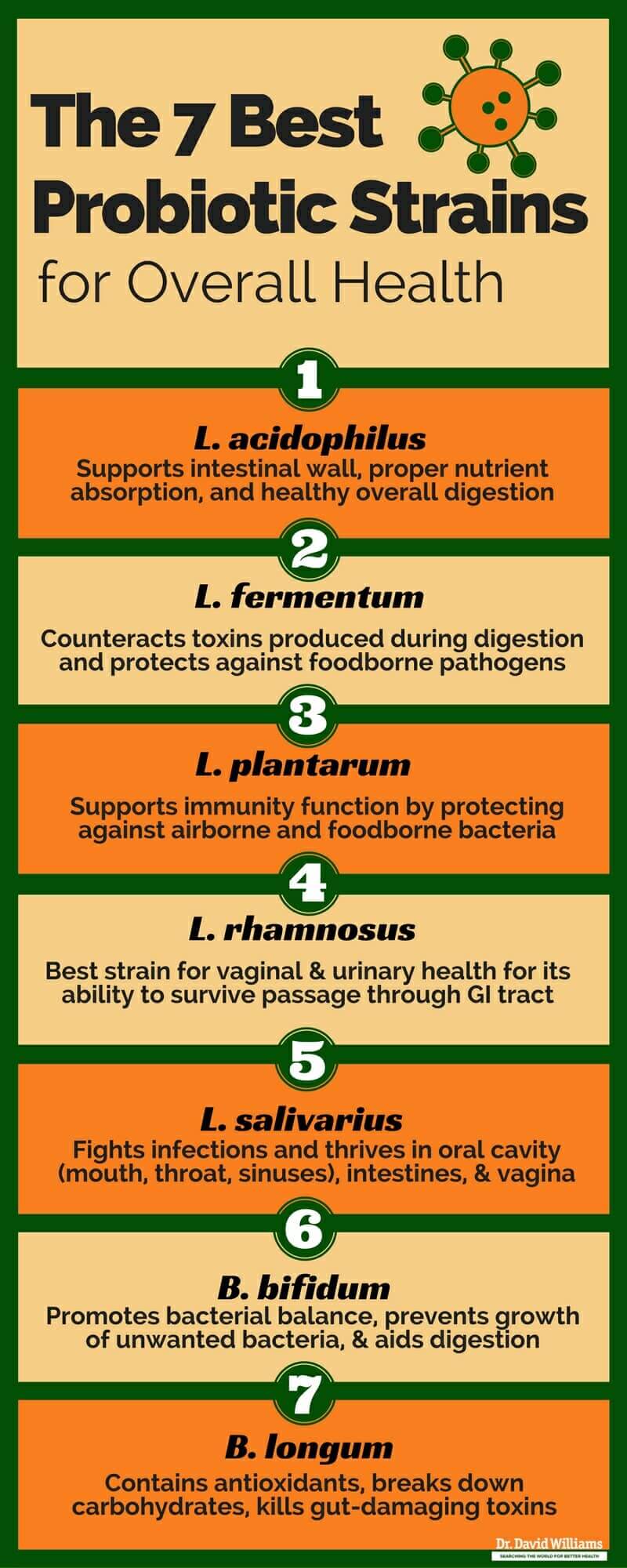
Over the last couple of years there's been a surge in popularity of probiotic supplements. This has created a lot of marketing hype, resulting in several misconceptions and myths. Because of these myths, people do not experience the full benefits of probiotics. This is the primary reason why many people give up and stop using them completely.
Here are the top 7 myths that cause people to misconceive about the benefits of probiotics, and why they are simply not true.
Probiotic Myth #1: One Strain Fits All
Variety is the spice of life, and the proper variety of bacterial strains is also the key to selecting a great probiotic supplement. Studies have now shown that the healthiest people have the greatest diversity of bacterial species in their gut.
It's important to keep in mind that the benefits from eating probiotic foods and/or taking a probiotic supplement come from establishing and supporting a healthy and diverse bacterial "environment" in the gut. The formulation of the best probiotic supplements combines bacterial strains that work synergistically, creating an environment that encourages the growth of beneficial strains and retards the growth of harmful or pathogenic strains of bacteria, fungi, and viruses. An environmental change doesn't occur by just adding one or two strains.
There's another factor involved in selecting a high-quality probiotic: the hundreds of competing bacterial species living in the gut microbiome can change depending on our needs at various ages. The best probiotic supplement for a 6-year-old might not be ideal for someone 50 or older. For example, a “senior” probiotic should do more than just help deal with constipation, diarrhea, bloating, gas, and other digestive complaints. Certain bacterial strains belonging to the Lactobacilli and Bifidobacterium species address these issues, as well as other problems unique to those of us getting older. Research has shown some strains of Bifidobacterium specifically help prevent the toxic effects of wheat gliadin, a component of gluten, which is a source of problems for many people.
And, the Bifidobacerium longum bacterium has been shown to stimulate the immune function in older adults for quite some time even after they've stopped taking it.
A formulation for those over 50 might also include the strain B. infantis, which helps ease inflammation linked to everything from pain and cardiovascular disease to cancer. Inflammation has become one of the hallmarks of aging. There’s no reason not to address it naturally with a targeted, daily probiotic.
In a high-quality supplement for most people, I like to see the following 7 best probiotic strains for overall health:
- L. acidophilus
L. acidophilusis one of the best probiotic strains of the Lactobacillus species, in my opinion. This bacterium mostly colonizes the small intestine, where it benefits the intestinal wall, ensures proper nutrient absorption, and support healthy overall digestive function. - L. fermentum
This probiotic strain produces superoxide dismutase and glutathione, both powerful antioxidants that help counteract some of the toxins produced during digestion. L. fermentum has also been known to protect the body from foodborne pathogens - L. plantarum
L.plantarumis known for its hydrogen peroxide production abilities. The body uses hydrogen peroxide as a defense against bacteria consumed in food, as well as other microorganisms. This strain is also known to support immunity function. - L. rhamnosus
This probiotic strain is thought to be among the best probiotic strains of the Lactobacillus species for vaginal health because it can survive the passage through the GI tract. Research has shown that L. rhamnosus may help improve vaginal and urinary health and decrease vaginal irritation. - L. salivarius
L. salivarius’s unique ability to grow in less ideal conditions, such has salty environments with or without oxygen, makes it one of the best probiotic strains for the health of oral cavities (mouth, throat, sinuses), intestines, and vagina. Research has shown that L. salivariusincreases immunity and prevents colonization of undesirable bacteria that invade the body and cause illnesses and infections. - B. bifidum
This probiotic strain is among the first to be found in the intestines of infants and continues throughout life to be one of the main groups of good bacteria found in the large intestine. (It can also be found in the small intestine.) In addition to helping promote bacterial balance, it prevents the growth of unwanted bacteria, molds, and yeasts by naturally adhering to the intestinal mucosa better than other bacterial strains. B. bifidum helps break down complex carbohydrates, fat, and proteins during digestion. It also produces enzymes that break the larger molecules down into smaller components that the body can more efficiently use. This strain can help prevent diarrhea, especially for travelers. - B. longum
B. longum’s digestive benefits stem from its ability to break down carbohydrates and to find and neutralize everyday toxins damaging the gut. Preliminary research suggests that the strain’s antioxidant properties can remove metal ions—especially copper—and seek out free radicals. It also supports immunity especially in the elderly.
While I recommend the above strains, I am also actively researching probiotic spores which are strains of beneficial bacteria that are “spore formers.” These bacterium have the ability to develop a hard shell that protects them from high temperatures or harsh conditions until they reach an environment suitable for germination, such as the human gastrointestinal tract. In addition to providing many of the same benefits as the bacteria strains I just described, some spore formers:
- Produce digestive enzymes
- Supply fungicidal compounds that help control fungal pathogens like Candida albicans
- Inhibit the growth of H. pylori, the organism associated with ulcers.
Probiotic Myth #2: The Higher the Bacteria Count, the Better
When choosing the best probiotic supplement, the bacteria count listed on the label isn't a good criterion for comparing probiotic products. Bacteria are some of the fastest replicating organisms on the planet.The right combination of bacteria in the warm, moist environment of the gut will grow exponentially in just a matter of hours. In the best probiotic supplement, it's more important that…
- The probiotic is packaged in such a way that the beneficial bacteria are still alive when you purchase the product.
- The tablet or capsule containing the bacteria is constructed so the bacteria can survive the exposure to the strong acids in the stomach and the highly alkaline secretions from the pancreas.To be of benefit, the bacteria must be alive when they reach the large intestine.
Probiotic Myth #3: Gas and Bloating Will Immediately Subside After Starting Probiotics
Excess gas formation is one of the primary symptoms indicating the need to re-establish the growth of beneficial bacteria in the gut. When this happens, the benefits of probiotics are usually needed to solve the problem. It's important to keep in mind, however, that in the beginning even taking the best probiotic supplement may actually cause someone to experience more gas and bloating.
It depends on the on the existing pH (acidity or alkalinity) of the colon. It often takes anywhere from a few days to as long as a month to get the pH of the colon back to normal.
The ideal range pH for the colon is just very slightly acidic at somewhere between 6.7 and 6.9. When there is an imbalance or lack of beneficial bacterial in the colon the pH is typically more alkaline like 7.5 or above.
When someone starts taking a probiotic supplement (or consumes probiotic-rich foods) the beneficial microorganisms begin to increase in number, lowering the pH in the colon. As the pH passes through the gas-producing range, some individuals may experience a temporary increase in gas production. Normalizing the pH could take anywhere from a few days to as long as a month.
Many people are never told what's happening to their body and they may assume the probiotic is only making the problem worse. Instead of continuing until their pH level drops low enough to get out of the gas-producing range, they quit taking the supplement prematurely and miss out on all the longer-term benefits of probiotics.
There are other factors that can keep the colon's pH from moving into a more natural acidic state. These include such things as amalgam tooth fillings, drinking chlorinated water, taking antibiotics or other bacteria-altering/destroying medications and a diet high in refined carbohydrates (pathogenic bacteria feed on simple sugars). A quality probiotic could help reverse the negative effects of these factors.
Probiotic Myth #4: Packaging Doesn’t Matter
Proper packaging is paramount when it comes to choosing the best probiotic supplement. The best probiotic strains are worthless if they aren't processed and packaged correctly. First, they need to be able to survive until at least the expiration date on the label. Utilizing the latest technology, the best products don't require refrigeration and allow the bacteria to isolate with their own "food supply" to remain active and viable until digested.
Second, the "delivery system" used in the probiotic supplement needs to protect the bacteria from being destroyed by the strong acids and digestive enzymes in the stomach and small intestine. This is important since the beneficial bacteria need to be released into the large intestine where they start to multiply rapidly and support all the enormous benefits that come from a healthy microflora.
Probiotic Myth #5: Expiration Dates Aren't Necessary
As you may know, a probiotic must be alive to work. Probiotics are beneficial bacteria, and like all living things bacteria have a limited life. Every probiotic supplement should be tested at the time of packaging, and then retested, to determine how long the number of bacteria listed on the label actually survive. Every probiotic should reflect this accurately with an expiration date.
The best probiotic supplements don't just list the number of bacteria at the time of production and packaging, but more importantly the number of alive and viable bacteria guaranteed up to the expiration date.
Probiotic Myth #6: Store-Bought Probiotic Foods Work
Very few so-called probiotic foods you find in the grocery store still contain live beneficial bacteria. Many of these foods may have been created by the fermentation effects of beneficial bacteria, but they had to be "stabilized" before they could be packaged.
Gas is produced during fermentation and it is a sign that bacteria are active and digesting carbohydrates. Yet, a packaged product that is still fermenting could explode or rupture. To remedy that situation, food producers and packaging companies stop the fermentation process with heat (pasteurization), chemical preservatives (bacteria inhibitors), irradiation, ultrafiltration, and other procedures that neutralize (kill) the bacteria. This increases the shelf life of the product, but eliminates the health benefits of probiotics in fermented foods.
When you ferment and create your own probiotic foods at home, you control the process and can make sure those foods are still rich in beneficial bacteria. Making your own sauerkraut is a great example; it's easy, inexpensive, delicious, and loaded with a variety of probiotics.
Probiotic Myth #7: Not Everyone Needs to Be Taking a Probiotic
This wouldn’t be a myth if people…
- Didn't consume chlorinated water and distilled their drinking water,
- Completely eliminated simple sugars and refined carbohydrates,
- Consumed only fresh foods that didn't contain anti-bacterial preservatives and chemicals to increase shelf-life,
- Lived in a pristine environment with perfectly clean air and verifiable, uncontaminated water supplies,
- Had never consumed antibiotics during their life or took any medications (almost every medication alters gut bacteria, not just antibiotics),
- Had perfect function of their digestive enzymes,
- Didn't have dental amalgam fillings,
- Wasn't born by cesarean section, but naturally to a mother with perfect health and then was breastfed for 2 or more years,
- Consumed a wide variety of live, homemade, fermented foods every single day,
- Ate large amounts of high-fiber fruits, vegetables, nuts, seeds each day to supply insoluble fiber to feed beneficial gut bacteria,
- Didn't consume any processed meat, meat products or meat that isn't totally chemical and/or hormone-free.
If you're anything like me, you try to eliminate (or at least minimize), the wrong foods in your diet and any harmful habits in your lifestyle. But unfortunately, there are many factors over which we have no control and none of us live in a totally pristine environment.
More and more research continues to show the unquestionable link between the variety of beneficial bacteria in our gut and our physical and mental health. In our modern world, these bacteria are under constant attack, and taking a quality, daily probiotic is some of the best "insurance" for your health you can get. That's why it called a pro-biotic...biotic means life. That's why I believe that along with fermented foods, a probiotic is the one supplement everyone on the planet should be taking every single day of their life. Just make sure you find the best probiotic supplement for your specific health needs.



